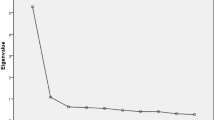Abstract
The aim of this work was to study the psychometric properties of the Chinese version of the Swallow Quality-of-Life Questionnaire (CSWAL-QOL) validated in the Hong Kong Chinese-speaking population. With convenience sampling, a cross-sectional survey was launched to evaluate the validity and reliability of the CSWAL-QOL. One hundred subjects with swallowing problems were recruited to evaluate the construct validity and internal consistency, and 20 subjects were recruited for the test–retest reliability. Construct validity was validated through factor analysis (both exploratory and confirmatory) and a correlation study between the CSWAL-QOL and the World Health Organization Quality-of-Life Questionnaire—abbreviated version [WHOQOL-BREF (HK)]. Reliability was estimated using tests of internal consistency and test–retest reliability. The psychometric properties of the CSWAL-QOL were found to be largely similar to those of the SWAL-QOL, except the three-item eating desire scale of the CSWAL-QOL, which showed insignificant results in the validity and reliability tests. The CSWAL-QOL is the first validated Chinese version of the SWAL-QOL in Hong Kong. It is a clinically valid and reliable tool for assessing the quality of life in dysphagic Chinese patients in Hong Kong, regardless of the causes of dysphagia.

Similar content being viewed by others
References
McHorney CA, Robbins J, Lomax K, Rosenbek JC, Chignell KA, Kramer AE, et al. The SWAL-QOL outcomes tool for oropharyngeal dysphagia in adults: III. Documentation of reliability and validity. Dysphagia. 2002;17:94–114.
Lovell SJ, Wong HB, Loh KS, Ngo RYS, Wilson JA. Impact of dysphagia on quality of life in nasopharyngeal carcinoma. Head Neck. 2005;10:864–72.
Ekberg O, Hamdy S, Woisard V, Wuttge-Hanning A, Ortega P. Social and psychological burden of dysphagia: its impact on diagnosis and treatment. Dysphagia. 2002;17:139–46.
McHorney CA, Bricker D, Kramer AE, Rosenbek JC, Robbins J, Chignell KA, et al. The SWAL-QOL outcomes tool for oropharyngeal dysphagia in adults: I. Conceptual foundation and item development. Dysphagia. 2000;15:115–21.
McHorney CA, Bricker D, Robbins J, Kramer AE, Rosenbek JC, Chignell KA. The SWAL-QOL outcomes tool for oropharyngeal dysphagia in adults: II. Item reduction and preliminary scaling. Dysphagia. 2000;15:122–33.
Chen AY, Frankowski R, Leone BJ, Hebert T, Leyk S, Lewin J, et al. The development and validation of a dysphagia-specific quality-of-life questionnaire for patients with head and neck cancer. Arch Otolaryngol Head Neck Surg. 2001;127:870–6.
Bogaardt HC, Speyer R, Baijens LW, Fokkens WJ. Cross-cultural adaptation and validation of the Dutch version of SWAL-QOL. Dysphagia. 2009;24:66–70.
Hong Kong Hospital Authority. Hong Kong Chinese Version of the World Health Organization Quality of Life Measure—abbreviated version, WHOQOL–BREF (HK), 1997
Beaton DE, Bombardier C, Guillemin F, Ferraz MB. Guidelines for the process of cross-cultural adaptation of self-report measures. Spine. 2000;25(24):3186–91.
Dennis C. The essentials of factor analysis. 3rd ed. London: Continuum; 2006.
Brown TA. Confirmatory factor analysis for applied research. New York: Guilford Press; 2006.
Cohen J. Statistical power analysis for the behavioral sciences, 2nd ed. Hillsdale, NJ: L. Erlbaum Associates; 1988.
Aday L. Designing and conducting health survey. 2nd ed. San Francisco: Jossey-Bass/Pfeiffer; 1996.
Portney LG, Watkins MP. Foundations of clinical research:applications to practice. 2nd ed. Upper Saddle River, NJ: Prentice Hall Health; 2000.
Nunnally JC, Bernstein IH. Psychometric theory. 2nd ed. New York: McGraw-Hill; 1994.
Author information
Authors and Affiliations
Corresponding author
Rights and permissions
About this article
Cite this article
Lam, P.M., Lai, C.K.Y. The Validation of the Chinese Version of the Swallow Quality-of-Life Questionnaire (SWAL-QOL) Using Exploratory and Confirmatory Factor Analysis. Dysphagia 26, 117–124 (2011). https://doi.org/10.1007/s00455-010-9272-6
Received:
Accepted:
Published:
Issue Date:
DOI: https://doi.org/10.1007/s00455-010-9272-6




